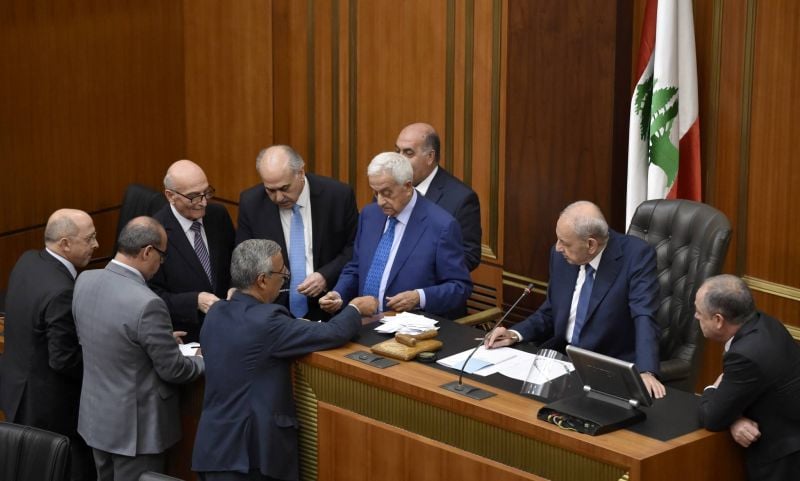
Nine male MPs pictured, including three-decades held Parliament Speaker Nabih Berri, head of the Amal Movement, and Free Patriotic Movement-affiliated Deputy Parliament Speaker Elias Bou Saab, who was also the former minister of education and minister of national defense. (Credit: Hassan Ibrahim/Lebanese Parliament)
“I don't see a president elected anytime soon," MP Michel Daher said, as Parliament’s third attempt to elect the next head of state failed. MPs are scheduled to reconvene Monday, just one week before the end of President Michel Aoun’s term, for the first of “consecutive sessions'' to elect a successor. A total of 119 out of Parliament’s 128 MPs participated in the vote. During yesterday’s round, candidates required 86 votes, or two-thirds of Parliament to vote in their favor, to win the presidency. The majority of MPs, 76, again cast protest votes — 55 blank, 17 for “New Lebanon” and four disqualified ballots — while MP Michel Moawad gained six more votes than he had received in the first round, totaling 42 ballots in his favor, and contender Miled Abou Malhab, a protester known for his unconventional activism, received a single vote. The MPs who voted blank and their critics seemingly agreed that the protest votes signified their lack of agreement on a candidate. Lebanese Forces head Samir Geagea in an interview with local television station MTV pleaded with the 22 voters that chose neither blank ballots nor Moawad, claiming that they “can make this vote succeed.” Lebanese Forces MP Georges Adwan after the session accused blank voters of not having the “courage to go to a second round," during which the additional 22 votes Geagea mentioned could lead to the simple majority needed to elect a candidate. Forces of Change MP Paula Yacoubian warned that "heading towards the vacancy is the most dangerous scenario," reiterating fears that no successor to Aoun will be named while a caretaker cabinet is in force thus plunging Lebanon into its first total executive power vacuum.
The Constitutional Council dismissed a third of pending appeals to May’s parliamentary election results, aiming to finish the review by the end of the month to avoid tainting Presidential election results, a source close to the council told L’Orient Today. Fifteen appeals for the invalidation of the results of the May legislative elections were presented in June to the Constitutional Council. The appeals cite invalidating factors to election results from corruption to vote miscounts. A number of requests could have a serious impact on Parliament's composition, tipping the balance against opposition MPs. Observers noted various violations in the period following the legislative election. György Hölvényi Chief Observer in the European Union Election Observation Mission monitoring the legislative elections a few days after the vote deemed the election valid, despite the mission’s report of rampant “vote buying and clientelism.” The EU observers in a preliminary report noted errors related to the counting procedures, including mismatches between the count of ballots cast and the number of voters along with “one case in which electricity cuts hampered the closing and counting procedures.” The Lebanese Association for Democratic Elections in its August report on the elections reported “vote buying, inequality in media coverage, violence and abuse of power by local authorities and parties.”
Beirut port customs officials foiled a Captagon trafficking attempt, seizing 165 kilograms of the illicit stimulant smuggled in cargo destined for Sudan, Interior Minister Bassam Mawlawi announced. The Internal Security Forces arrested a man allegedly linked to the smuggling attempt, suspected of forging his signature on a shipment of construction equipment laced with around one million pills of Captagon. Yesterday’s seizure marks the third foiled attempt to smuggle pills from Lebanon to Sudan after the drug was found seeded in a shipment of grapes in September and squeezed into boxes of powdered juice in January. The September shipment located Sudan as a transit point where the pills would be sent to Kuwait. The popularity of the drug coupled with authorities’ crackdown on it in Gulf countries has made its production and smuggling an enticing prospect for drug traffickers. Gulf authorities, however, repeatedly call on Lebanon to curb any contraband consignments on its territory.
Lebanon records 51 new cholera cases over the last two days bringing the total to 220 confirmed cholera cases since the beginning of the outbreak while the death count stood at 5, the Health Ministry announced on Thursday evening. The Health Ministry warned on Wednesday of the “rapid spread of the disease.” Caretaker Health Minister Firas Abiad linked the mortality rate to a lack of medical care, urging anyone showing symptoms to go to the hospital. Contaminated water sources increased fears of the disease’s spread as local and international groups pledged to allocate the necessary resources to water infrastructure to prevent further infections.
In case you missed it, here's our must-read story from yesterday: “Three years later, the thawra’s survivors are still neglected.”
Compiled by Abbas Mahfouz